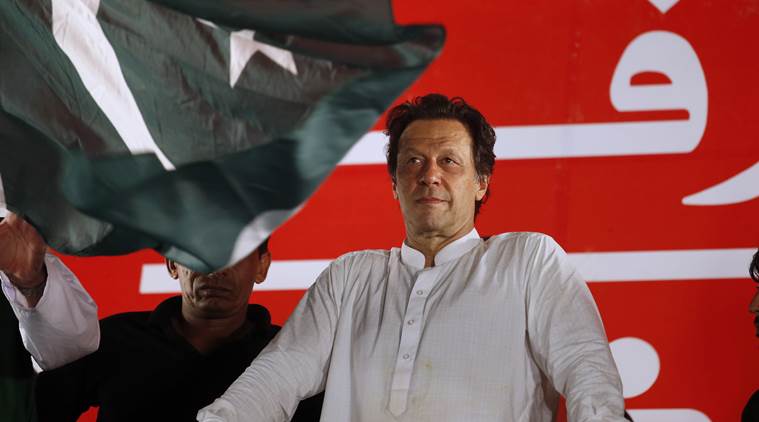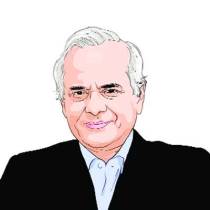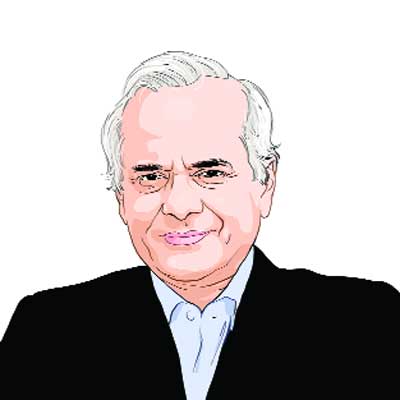Three men & a possibility
Kuldip Nayar and Vajpayee rejected narrative of Partition for India-Pak. Imran Khan can rewrite the script

Like every great sportsman, Imran Khan knows that rivalry on the pitch does not foreclose the possibility of conviviality beyond it.
Our former Prime Minister, Atal Bihari Vajpayee, and the veteran and respected journalist, Kuldip Nayar, passed away within a week of each other. Sandwiched between their funerals was the “birth” of Imran Khan’s government in Pakistan. Imran was sworn in as PM the day after Atalji breathed his last. Prima facie, these were three unconnected events.
In fact, when seen in the context of India-Pakistan relations, there was a linking thread. In their lifetime, Atalji and Kuldip Nayar strongly resisted the dominant narrative of Partition that destined the relations between these two countries to a fate of mutual suspicion, if not enmity. Imran, in his first public pronouncement as PM elect, also rejected this sclerotic view of the past and the future. This article is written in a spirit of reflection about this coincidental confluence and the redemptive possibilities inherent in the link uniting these three individuals.
I have a personal connect with all three. Indirectly, with Atalji. My father was foreign secretary when he was foreign minister. Directly, with Kuldip Nayar and Imran. The Mehta and Nayar families have been longstanding friends. I was “Kuldip kaka’s” research assistant in 1977 when he speed-wrote the book on the Emergency. And I was Imran’s classmate at university in England. It is this personal connect rather than any direct involvement with the complexities of India-Pakistan politics that has prompted these reflections.
My father accompanied Atalji to Pakistan in 1977. Atalji had recently been appointed foreign minister of the newly-elected Janata government. Pakistan was his first international trip in that position. On their return, I recollect my father telling me about the extraordinary impact Atalji had on the Pakistan public and his interlocutors. Details of that famous trip are provided in various books, including my father’s autobiography but what is important to recollect here is how he disarmed the assembled press that had gathered to listen to not just the FM of India but also the man who had for years, as an Opposition member of the Jan Sangh in Parliament, called for “Akhand Bharat” and led a demonstration against the Simla Agreement. In his opening remarks, Atalji acknowledged implicitly his anti-Pak past but then offered Pakistan the promise of sincere and friendly relations. Later, he embedded his secular credentials by visiting a mosque, a gurdwara and a temple and at the banquet in his honour, he outshone his host, Agha Shahi, by giving an extempore speech in beautiful Urdu. Atalji knew he was taking risks, particularly with his ideological allies in India, but he refused to be strategic or straitjacketed by the old narrative. The outcome was tangible. Cricketing ties were resumed after a gap of 18 years; the consulates in Karachi and Mumbai, which had been closed since the 1971 war, were reopened and an agreement was signed to construct a hydro-electric dam on the Chenab river.
Kuldip Nayar witnessed, at first hand, the traumas of Partition. His family was uprooted from Sialkot and compelled to migrate to India. Most people who faced similar suffering did not, perhaps could not, forget or forgive. They were, with understandable warrant, consumed by memory. But Kuldip looked beyond that harrowing tragedy, never diminishing it and yet never allowing it to constrain his vision of the future. All his working life, he used the power of his pen and the strength of his personality to remind people in both countries of their common civilisational inheritance of tolerance and decency and the immutable logic of geography. He co-authored Tales of two cities with Asif Noorani, a Pakistani journalist, and from 1992 onwards, year after year and despite the infirmities of age, he led a candle light vigil on the nights of 14/15th August at the Wagah land border between India and Pakistan, shouting “Hindustan-Pakistan dosti zindabad”. The fulsome tributes that flowed from Pakistan on his death testify to the chord that he struck in the minds and hearts of people on the other side. Like Atalji, Kuldip also refused to accept the conventional narrative of Partition. Rather, he saw in the history of these two countries possibilities that included dosti and cooperation.
Imran Khan is now PM of Pakistan and he is constrained by the burdens of his office and the various constituencies he must respond to. But if one were to look at his public proclamations, first as a cricketer and then as a politician, one can have no doubt that he would echo the chants raised by Kuldip Nayar. Imran has been engaged with India and Indians for more than four decades. Like every great sportsman, he knows that rivalry on the pitch does not foreclose the possibility of conviviality beyond it. The speech he delivered shortly after his party emerged as the largest single party in the Pakistan assembly, points to that conviction. He said “India needs take but one step and we will take two.” We can, as many in our press have chosen to, be suspicious and dismissive of such words as empty rhetoric. But we can also, as I believe Atalji and Kudip Nayar would have chosen to, see them as an invitation to reframe the narrative.
History is replete with examples of patterns of behaviour between nations locked into a narrow rut by suspicion, paranoia and conflict. The Israel-Palestine conflict and the decades of the Cold War are two such examples. But history also offers examples of how leadership driven by courage, conviction and vision can alter such patterns in a blink. Consider the dramatic reordering of the map of Europe following Michael Gorbachev’s decision in 1989 to set aside the old rule book on the Soviet Union and the Cold War.
History is replete with examples of patterns of behaviour between nations locked into a narrow rut by suspicion, paranoia and conflict. The Israel-Palestine conflict and the decades of the Cold War are two such examples. But history also offers examples of how leadership driven by courage, conviction and vision can alter such patterns in a blink. Consider the dramatic reordering of the map of Europe following Michael Gorbachev’s decision in 1989 to set aside the old rule book on the Soviet Union and the Cold War.
Atalji and Kuldip Nayar displayed such qualities of leadership during their lifetime. I know that Imran has such qualities. I reflect on the possibilities that this offers for India and Pakistan to contemplate a fresh narrative.
For all the latest Opinion News, download Indian Express App
More From Vikram S Mehta
- Trump’s foreign policy: An unlovely triangleBetween strategic-energy interests with Iran and a flip-flopping US president, India must find its own balance. ..
- Over The Barrel: Networked and vulnerableA tightly-connected world is more imperilled by cyber attack, disease and global warming. It requires inspired leadership. India and China have an opportunity. ..
- Over The Barrel: Because the business of business isn’t just businessPooling Corporate Social Responsibility funds will facilitate sharing of experiences, reduce duplication of efforts and facilitate a geographically equitable distribution of resources...












.png)



























No hay comentarios:
Publicar un comentario